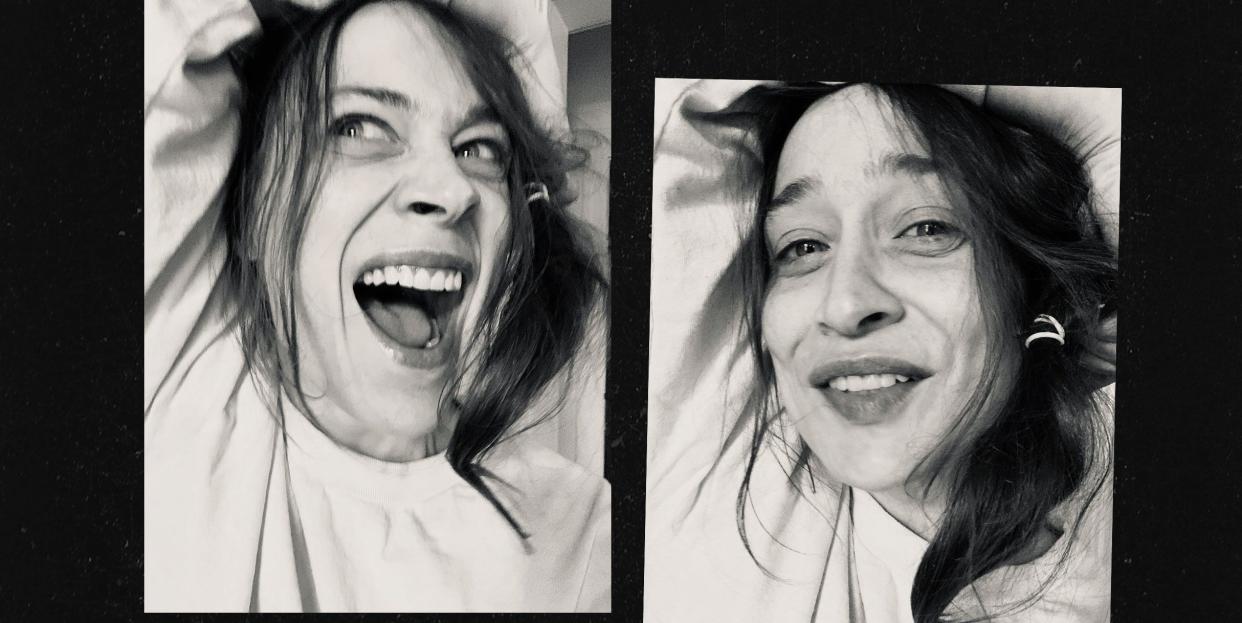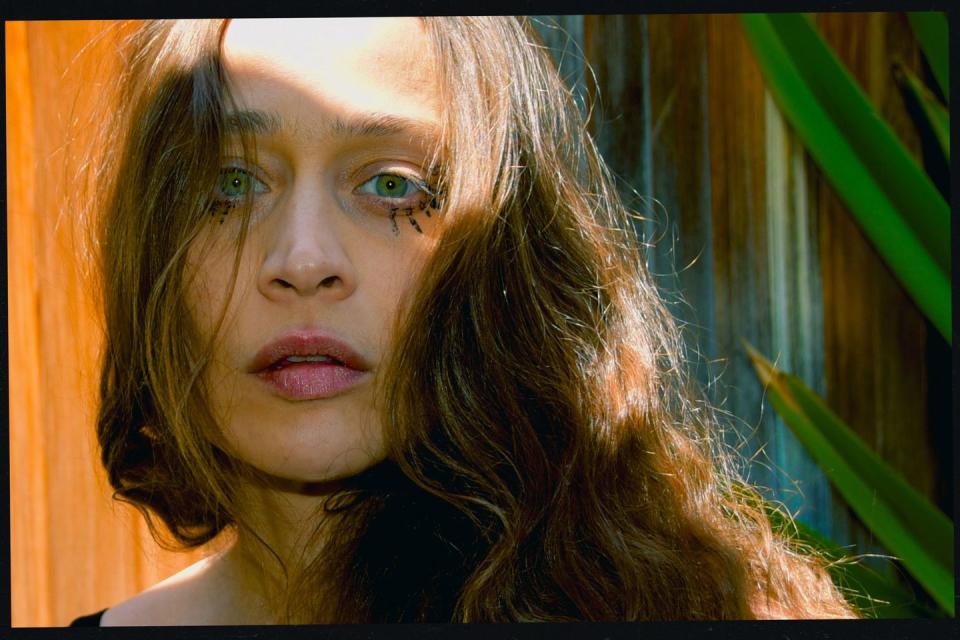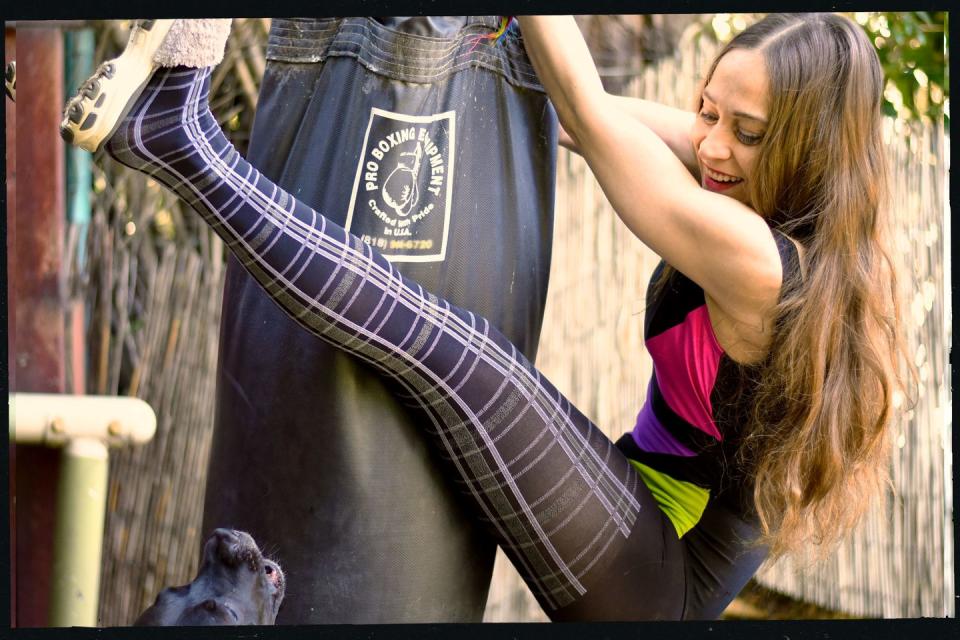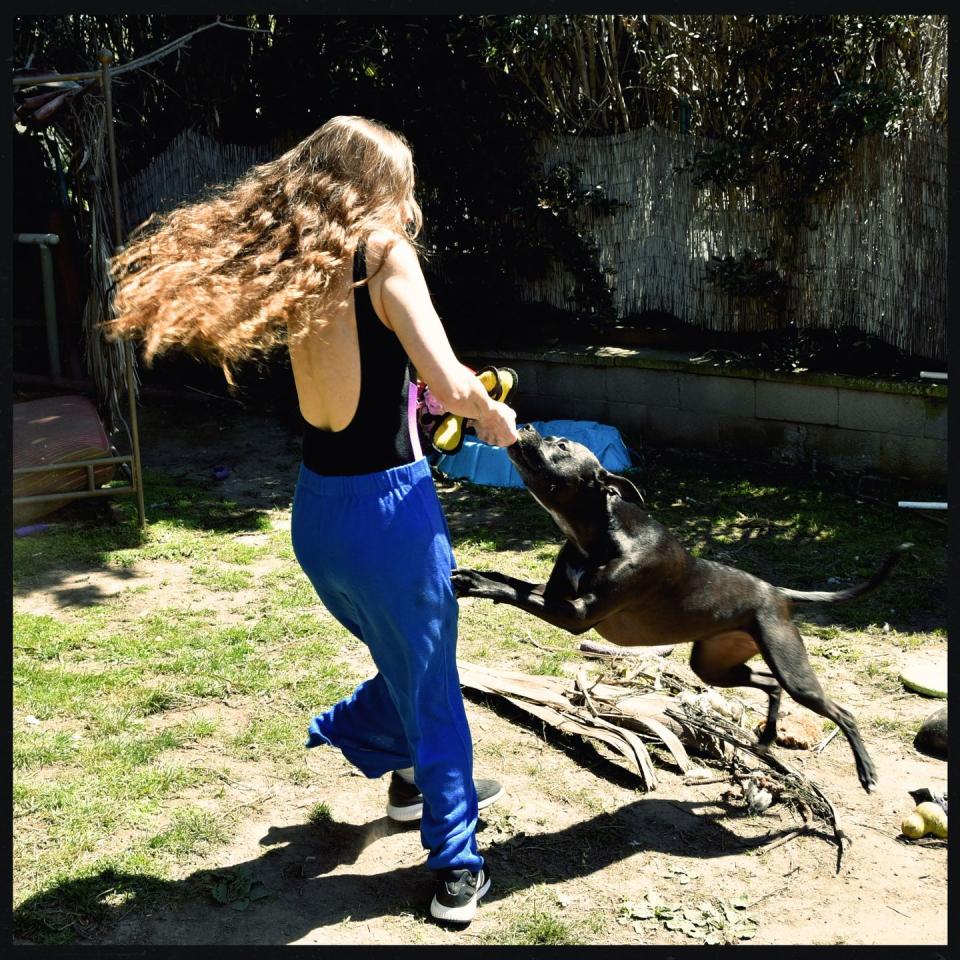Fiona Apple Is Finally Free


Fiona Apple is at home. It’s where she likes to be. Her almost-century-old Craftsman bungalow sits on an otherwise unassuming Venice, California street. A heavy, locked door leads into a riotous walled garden, filled with the barks of her rescue pitbull-mix, Mercy. The dog signals someone’s arrival better than any doorbell can—which is good, because Apple’s doorbell is broken.
Or at least it was the first time I visited, in the middle of last year, a few months after a video clip of the 42-year-old singer-songwriter began circulating on social media, alerting fans to the fact that she was working on new material—but long before a global pandemic would force so many of us into our own homes.
Back then, she’d warned me via text that there would be two dogs—big ones—adding that if that made me nervous her housemate, filmmaker Zelda Hallman, could take them to the park before our interview. Apple also told me she was nervous. It was the very end of June, officially summer, but Los Angeles was masked in a gray gloom that felt like a kind of purgatory, a suspension. Apple hadn’t done an interview in seven years, not since the release of her last album, The Idler Wheel…, after which she promptly disappeared.

It’s not disappearing, though, if you don’t really go anywhere. And Apple doesn’t, not usually. Every time I’ve gotten in touch—to arrange my June visit, and another in October, and even a recent FaceTime follow-up call—her message has been the same: “I’m here! I’ll be here!”
During that last phone call, a few hours before the release of Fetch the Bolt Cutters, Apple was conflicted. “It’s hard to really say this—this is a horrible time for so many reasons, and so many people are losing their jobs and people are becoming homeless and people are sick and people are dying,” she told me. “But if you take it down to the micro part of it—in one person’s life, in my life with this album—I was so scared of all the shit I was going to have to do. It was really kind of crippling. And I didn’t really even know at times if I was going to be able to do it.”
The “It” she’s referring to is the activity swarm that surrounds a new record—the press, photoshoots, tours, etc.—most of which has vanished in an age of social distancing. Apple pauses to clarify how much she empathizes with and supports other artists who’ve postponed releases and tours, but for her, “this album cycle, whatever you want to call it—feels really good, because I’m making all the choices. All that stuff was really dragging me down inside—I just wanted to put out the album.”
Apple and her team had been discussing possible October release dates, but then all of a sudden April started making sense. The kicker, she says, was receiving a text from Mikaela Straus (aka King Princess) that said something like, “Fi, when are you going to put out your album? C’mon, people want something to listen to.”

Straus was right. Within minutes of its official release, at midnight on April 17, Fetch the Bolt Cutters was seemingly everywhere—wafting from open windows and through the floorboards of neighboring apartments. It garnered rave reviews, from Pitchfork’s extremely rare perfect 10 rating to a nonstop stream of accolades on Twitter, tweet after tweet thanking Apple for giving the world something to focus on that wasn’t the pandemic.
And yet, it’s hard not to feel like this album was made for this time, particularly in the way that it’s grounded in Apple’s house—literally, in the syncopated percussion of banged-on walls and stomped-on floors—but also in how it’s rooted in the idea of finding freedom after a lifetime of restraint. There’s a jitteriness to it, an anxiousness, but there's also a feeling of being unbound. From the visceral, Yoko Ono–esque yawp at the end of “I Want You to Love Me,” to the bitter defiance of “Under the Table” (“Kick me under the table all you want/ I won’t shut up”), Apple, as always, is singing what so many of us are feeling.

Fiona Apple’s resistance to the trappings of fame and celebrity is the stuff of legend—she was only 20 when she accepted an MTV Video Music Award in 1997, telling the audience and millions of at-home viewers that “this world is bullshit.” Though she’s released a mere handful of albums since then, her influence can be heard in the work of countless artists (Phoebe Bridgers, King Princess, St. Vincent, and Billie Eilish, to name just a few). Her fans are devoted to the point where it wouldn’t be surprising to learn they’ve had Apple’s lyrics tattooed on their brains. All the while, she has maintained a singular level of artistic integrity in an industry where those two words can seem like an oxymoron.
She’s done that last thing, at least in part, by becoming something of a hermit. Apple initially agreed to talk to me because I’d written an essay about her music and her image and the way both have been manipulated—most often by male critics—and she’d thought it related to her new work, which, she’d said, was a reflection of the times in her life when she’d felt powerless, when she didn’t have a voice, when she was a child.
Despite her warning via text, Apple didn’t seem all that nervous during our initial meeting back in June. Her voice was warm, expansive; it quivered only when she laughed, like when she called Mercy a “prude” for jumping up at the sound of the word “fucking.” Her gaze was generous and steady, eyes a limpid pistachio-green; her fingers flew around as she talked. Her loose cotton tank top was a light sky blue. She wore Crocs.
Being in Apple’s home feels a little like peeking inside her head, which is to say it feels a lot like listening to her music. There’s an instant familiarity, and an almost aggressive intimacy thanks to a living room populated by two beds pushed against the walls. Records and books line a room-spanning shelf. A drawing of a rooster and the words “scorpion heart” are scrawled onto a rolling chalkboard by the front door (a scorpion’s heart is on the outside of its body, Apple tells me).


The entirety of Fetch the Bolt Cutters was written and recorded in this space. “I’m at a point in life where you start recognizing things that your childhood affected,” Apple says, seated on one of the twin beds. “Before that, you’re just living your life. Then you hit this stage and you kind of backtrack, like, 'Why am I handling this that way? Why do I have that problem?' There’s just a lot of delayed angst. I feel like things that I have gone through [lately] just so plainly echo so many feelings that I had when I was younger. Childhood is in there, but it’s also just me working shit out, really.”
The result is a collection of songs about survival, though they’re never explicitly victorious. Rather, they’re about maintaining in the face of depression or trauma, or in the knowledge that one of the few reliable things in life is pain. One of the childhood-inspired songs, “Shameika,” recalls a positive interaction with a kind classmate who told Apple she had “potential.” “For Her” was written for someone unable to speak about what had happened to her. “I guess that’s also a theme,” she says. “Being able to not be shut up.”
Apple has long been a patron saint for women who have been told to be quiet, especially in songs like “Sullen Girl,” told from the point of view of a sexual assault survivor, or “Criminal,” which subverts the male gaze. Whether she’s calling out the world’s bullshit in an awards show speech, or gaslighting in a song like “Paper Bag”—“It’s all in your head / and I said “So’s everything”—Apple has used her voice to speak for those who have long struggled to be heard. But it’s taken her some time to figure out the best way to wield that power within an industry—and society—that has a long history of marginalizing anyone who seeks to subvert the status quo, anyone who isn’t willing to play the game.
“It’s just not in my nature,” Apple says. “There’s part of me that wants to be [able to do that], but I think there’s a part of me that wants to keep myself innocent of some things so I can just stay purely myself.” That’s easier said than done in the best of circumstances, and the music industry—particularly for women—can fairly be called the worst of circumstances: It’s often isolating, vicious, and full of the kind of people who lick their lips, waiting to see who’s going to fall next, eager to gnaw at their bones.
Apple has had experiences with predators and scavengers alike (about Harvey Weinstein, she tells me, “I am proud to say that I met him once, and the only thing I ever said to him was, ‘My God, you really are an asshole’”), but what’s really lingered with her is the isolation she felt in the early days of her career. It wasn’t just that she felt like it was her versus the world, it’s more that it actually was that way.

If she could go back, she would’ve done things differently: “I would’ve gotten a little fucking posse of friends to go with me to photoshoots and just be around,” she says. She remembers being castigated for not being grateful enough for all her opportunities, condemned for not thanking those who exploited her. “Being by yourself—I almost feel like I’m gonna cry right now—being by yourself in the world...people were not nice. It made me feel really bad about myself. Lots of shit that happened at photoshoots was not cool. So, I would’ve gotten friends. I would’ve kept people around me.”
Apple has people—friends and family—around her now. She stopped drinking over a year ago, and has dedicated time to promoting and funding causes that are important to her: donating royalties from “Criminal” to the border crisis organization While They Wait; funding groups that provide spaying and neutering, like Stand Up for Pits and The Help for St. Landry Parish Animal Control and Rescue.
During our FaceTime call, she makes a point of talking about the work of organizations like Seeding Sovereignty, and mentions the disproportionate effect the coronavirus pandemic is having on the Navajo nation. She’s also been thinking about all the people who have recently taken in foster dogs, and are maybe unprepared to train them, recommending Susan Garrett’s ‘It’s Yer Choice’ technique for new dog-owners. Apple still takes to heart the words she said at the end of that MTV speech: “Go with yourself.” To her, it means pursuing the kind of work that makes the more difficult parts of fame—and life—worth it.
The second time we talked was on a bright blue day at the beginning of October. I walked up to the heavy door, heard Mercy barking, and soon enough Apple was leading me through the still-blooming garden and into her house.
A few days earlier, she’d gone from not having been in the press for the better part of a decade, to being, well, everywhere. First, there was the phone interview with Vulture. Then a Tumblr comment Apple had made about Lil Nas X’s unauthorized use of her song “Every Single Night” for his track “Kim Jong Un” had caused a stir.
Apple told me she was glad she’d contacted the Vulture writer, and that she thought good things had come out of it—specifically that there was more attention being paid to While They Wait—but she realized that once she put herself out there, she couldn’t control what came next: “I was just sitting there going, ‘Okay, this is good, I’m learning something here.’ I learned that even when it’s good press, I don’t feel comfortable being out here so much. I don’t like it.”
She’d been considering starting her own Instagram, “but no—no fucking way would I ever do that now,” she says. “I don’t want that kind of presence. You gotta be made of something else. I’m not looking to be a gazillionaire or a superstar. I’m just going to do this exactly how it makes me comfortable.”
“This” didn’t just mean press. At the time, it also meant that Apple wasn’t going to release her album until she was ready. She told me she’d taken a break from recording over the summer, and that it might delay the album, and that she was okay with that.
On Friday, April 17, she was ready. And so were we. Fetch the Bolt Cutters doesn’t just feel like something to listen to right now—it feels like the thing to listen right now. It’s an album for a restless audience, songs for people stuck at home, people who need to break free, people who rarely step past their front doors. Apple’s voice has never sounded so strong, even as it occasionally wavers, even as it harmonizes with Mercy’s barks (and a bark or two from another album contributor, model Cara Delevingne). Apple sounds like she’s in her element—and she is. She’s at home, where she can most be herself.
She likes that we’re all at home for a little while, too—not the reason we’re all at home, of course, but she likes knowing that her music can serve as a respite for some people, and she likes that it makes listeners into more active participants.
“Everybody right now is settling into this role of being an audience for a while, and just taking things in,” she says. I can’t tell what room she’s speaking to me from through the rectangular screen on my phone, but I know she’s at home. “I’ve always kind of felt that that’s what I’m doing when I’m taking time off—I’m just being an audience to everything that’s going on,” Apple continues. “Being an audience is an essential part of being an artist, and being part of art. It doesn’t mean anything without someone else feeling it. It [means something] to yourself, when you’re making it, but it’s not complete until it’s felt by the listener. I feel like the listener is part of the band or part of the music in some way. I feel like it’s a really beautiful part of being alive.”
It’s tempting to turn to Apple and her music as if she were some kind of a sage, someone who holds all the answers to the questions we’re too scared to ask ourselves. But the reality is both more banal and more exhilarating: Apple is just a person, often messy, ever brilliant, but one who has embraced the experience of slowing down and looking inward, so she can more deliberately interact with and even understand the outside world.
Apple once told me about a self-imposed rule she lives by, to always question her motives. “It’s easy to forget to do that. But, I think when you do, and you’re at peace with the reason you’re doing something, it’ll lead to good things,” she says. “And that’s not like, ‘the universe will manifest shit for you.’ It’s just that if you make those kinds of decisions, then you run into the right people and you’re in the right places and it cultivates your environment in a different way. Don’t do all the shit that makes you feel crappy, because it’s just going to keep you in the crappy world. Do the shit that makes you feel good, and then you’re helping, it matters, and you’re bringing a moment of ease to somebody somewhere.”
On that bright October day, back when it was possible to go inside someone’s home and hug them hello and hug them goodbye, Fiona Apple walked me back out through her garden, Mercy at our heels, and asked me three more questions that have stayed with me. I try and answer them anew every day.
“Who are you trying to impress? Who are you trying to satisfy? Are you going to make yourself happy?”
You Might Also Like

